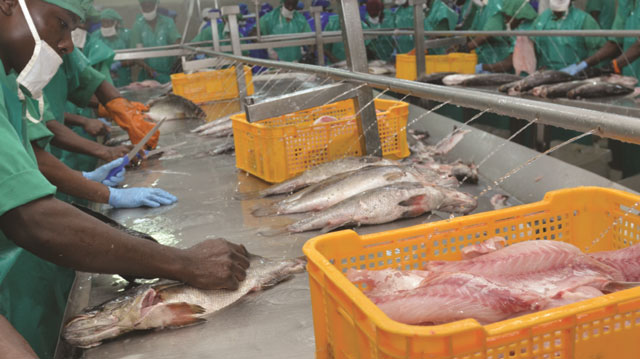
MAAIF, FAO advance efforts towards regulation of fisheries and aquaculture
Kampala, Uganda | THE INDEPENDENT TEAM | Uganda will soon have a new Fisheries and Aquaculture law, if the proposed Fisheries and Aquaculture Bill, 2018, is reviewed and approved by Cabinet and Parliament.
The proposed law is a revision of the Fish Act of 2000 Cap 197, which only regulates capture fish and does not address aquaculture activities such as management of commercial fishing, fish selling, post-harvest handling, fish transportation, surveillance and control monitoring of fisheries units as well as fisheries research.
The proposed Bill is part of efforts by Ministry of Agriculture, Animal, Industry and Fisheries to provide an enabling policy and regulation framework to the stakeholders engaged in fisheries and aquaculture activities.
The fisheries and aquaculture sub-sectors contribute significantly to Uganda’s national economic growth, development as well as food and nutrition. In fact, Uganda has one of the largest fresh water resources in the world and almost 20 percent of its surface area is water.
This expansive water resource has supported fisheries sector, enabling both capture and farmed fisheries since 1920s.
While fisheries contributes 12 % of agricultural GDP of Uganda and supplies 50 % of animal proteins consumed in the country, a number of challenges, which seriously affect the economic and social contribution of fisheries and aquaculture, cripple the vibrancy of the sub-sector.
Some of the challenges include over fishing caused by increasing demand due to population growth, use of illegal fishing gear, poor quality of fish seeds, limited access to fish seeds and feeds, as well as continued trade in illegal and unrecorded immature fish hence costing the country about US$ 429million in income lost.
These, coupled with weak legal and institutional frameworks are major bottlenecks to the development of a favorable fisheries and aquaculture sub-sector in Uganda.
The proposed Fisheries and Aquaculture Bill, 2018 is therefore expected to help address some of these challenges and foster a sustainable fisheries and aquaculture sub-sector.
As part of the review process of the proposed Bill, MAAIF and Food and Agriculture Organisations, through the Food and Nutrition Security Impact, Resilience, Sustainability and Transformation (FIRST) Project, organized a National Validation Workshop of the Fisheries and Aquaculture Bill, 2018 o Jan.25 at Colleen Hotel in Mukono.
Participants who include key stakeholder in the sector have reviewed the current version of the draft Bill, validated it and produced a final version of the Draft Fisheries and Aquaculture Bill, 2018, that will subsequently be sent to cabinet for approval.
The validation workshop was held on the backdrop of regional and country-wide consultations that generated views from relevant regional and local government stakeholders, on the proposed Bill.
Vincent Sempijja, the minister for MAAIF commended FAO and other stakeholders for prioritizing the fisheries and aquaculture sub-sectors and promoting relevant laws to ensure sustainability.
“While the Fish Act, Cap 197, provides for the control of fishing, fish conservation, purchase, sale, marketing, processing of fish, it is now outdated to address current technological advancement and the changed fisheries sector,” he said.
He added that “The Fisheries and Aquaculture Bill is long awaited in Parliament and should be finalized as soon as possible” to facilitate its enactment into law.
FAO Representative in Uganda, Antonio Querido said the proposed Bill will help to regulate developments in the fisheries and aquaculture sub-sectors, while fostering sustainable and nutritious food production in Uganda.
“If not regulated, aquaculture can become a potential risk to the environment such as increased water pollution and loss of biodiversity. Unplanned aquaculture can also lead to competition among other resource users that can degenerate into conflicts”, he said.
“The proposed law will also help to address post-harvest losses resulting from inadequate fish handling facilities and poor hygiene while also increasing availability of fish and fisheries products for marketing and consumption,” he added.
Fish production
Data from the Directorate of Fisheries Resources in the Agriculture Ministry shows that the total fish captured in Uganda fell by 14.6% from 461,730 tonnes in 2015 to 394, 224 tonnes in 2016 as a result of reduced catches of Nile Perch.
However, catches of Tilapia and small fish types increased. Overall, capture of fisheries from the lake remained the major contributor to total fish production, accounting for 77%.
On the other hand, aquaculture production grew by 5.4% from 111,033 metric tonnes in 2014 to 117,000 metric tonnes in 2015.
On the export front, fish volumes to the international market decreased from 18,785 tonnes in 2015 to 16,168 tonnes in 2016, with the majority of the volumes destined to the European Union.
Consequently, this led to a decline in export earnings from US$134.791 million to US$113.0 million during the same period under review.
This, however, is still far below the 36,616 tonnes exported in 2005, earning the country over US$143 million.
 The Independent Uganda: You get the Truth we Pay the Price
The Independent Uganda: You get the Truth we Pay the Price


